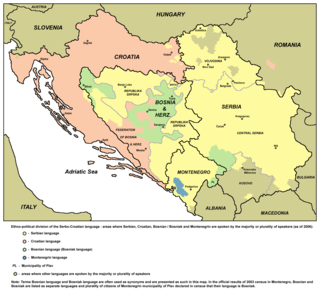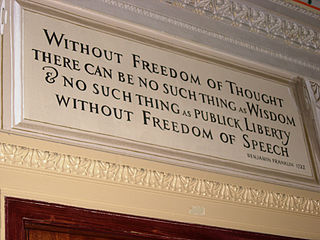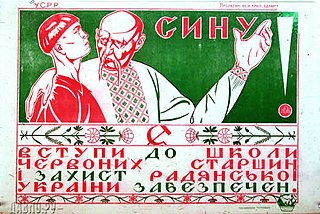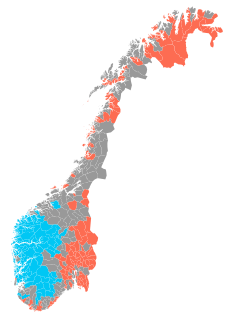 W
WThe Anti-Cyrillic protests in Croatia were a series of protests in late 2013 against the application of bilingualism in Vukovar, whereby Serbian and the Serbian Cyrillic alphabet were assigned co-official status due to the local minority population. The implementation of this decision became mandatory after the 2011 Croatian census, according to which Serbs in Vukovar comprise more than one-third (34.8%) of Vukovar's total population. Signs in the Serbian Cyrillic alphabet had been put up as the Constitutional Act on the Rights of National Minorities mandates bilingual signs in any area where more than one-third of the population belongs to an ethnic minority. This decision became subject of intense agitation by, among others, Croatian war veterans and many ordinary citizens who believe that due to events, particularly the Battle of Vukovar, the city should have been excluded from the application of the law on minority rights, although protests and vandalism have occurred in other towns and cities. The Serbs of Croatia are a minority group that have the narrowest usage of right to bilingualism among all national minorities in Croatia.
 W
WAccording to most adherents of the Latter Day Saint movement, the Book of Mormon is a 19th-century translation of a record of ancient inhabitants of the American continent, which was written in a script which the book refers to as "reformed Egyptian". This claim, as well as all claims to historical authenticity of the Book of Mormon, are rejected by non-Latter Day Saint historians and scientists. Linguistically based assertions are frequently cited and discussed in the context of the subject of the Book of Mormon, both in favor of and against the book's claimed origins.
 W
WCollateral damage is any death, injury, or other damage inflicted that is an incidental result of an activity. Originally coined by military operations, it is now also used in non-military contexts.
 W
WStandard Bosnian, Croatian, Montenegrin, and Serbian are different national variants and official registers of the pluricentric Serbo-Croatian language.
 W
WThe debate on traditional Chinese characters and simplified Chinese characters is an ongoing dispute concerning Chinese orthography among users of Chinese characters. It has stirred up heated responses from supporters of both sides in mainland China, Hong Kong, Macau, Taiwan, and among overseas Chinese communities with its implications of political ideology and cultural identity. Simplified characters here exclusively refer to those characters simplified by the People's Republic of China (PRC), instead of the concept of character simplification as a whole. The effect of simplified characters on the language remains controversial, decades after their introduction.
 W
WThe Declaration on the Common Language was issued in 2017 by a group of intellectuals and NGOs from Croatia, Bosnia and Herzegovina, Montenegro, and Serbia who were working under the banner of a project called "Language and Nationalism". The Declaration states that Croats, Bosniaks, Serbs and Montenegrins have a common standard language of the polycentric type.
 W
WThe Declaration on the Name and Status of the Croatian Literary Language is the statement adopted by Croatian scholars in 1967 arguing for the equal treatment of the Serbian, Croatian, Slovene, and Macedonian language standards in Yugoslavia. Its demands were granted by the 1974 Yugoslav Constitution.
 W
WA euphemism is an innocuous word or expression used in place of one that may be found offensive or suggest something unpleasant. Some euphemisms are intended to amuse, while others use bland, inoffensive terms for concepts that the user wishes to downplay. Euphemisms may be used to mask profanity or refer to taboo topics such as disability, sex, excretion, or death in a polite way.
 W
WFreedom fries was a politically motivated renaming for French fries in the United States. The term was created in February 2003 in a North Carolina restaurant, and was widely publicized a month later when the then Republican Chairman of the Committee on House Administration, Bob Ney, renamed the menu item in three Congressional cafeterias. The political renaming occurred in context of France's opposition to the proposed invasion of Iraq. Although some restaurants around the nation followed the renaming, the term became unpopular, in part due to declining support for the Iraq War. Following Ney's resignation as Chairman in 2006, the change in congressional cafeterias was reverted.
 W
WFreedom of thought is the freedom of an individual to hold or consider a fact, viewpoint, or thought, independent of others' viewpoints.
 W
WThe Gospel riots, which took place on the streets of Athens in November 1901, were primarily a protest against the publication in the newspaper Akropolis of a translation into modern spoken Greek of the gospel of St Matthew, although other motives also played a part. The disorder reached a climax on 8 November, "Black Thursday", when eight demonstrators were killed.
 W
WThe Hindi–Urdu controversy arose in 19th century colonial India out of the debate over whether the Hindi or Urdu language should be chosen as a national language.
 W
WIndigenization is the act of making something more native; transformation of some service, idea, etc. to suit a local culture, especially through the use of more indigenous people in administration, employment, etc.
 W
WLanguage politics is the way language and linguistic differences between peoples are dealt with in the political arena. This could manifest as government recognition, as well as how language is treated in official capacities.
 W
WThe Language Question was a linguistic and political controversy in the British colony of Malta which lasted from the early 19th to the mid-20th centuries. It began as a dispute over whether the dominant language on the islands should be English or Italian, and it ended with the native Maltese becoming an official language alongside English.
This article lists times that items were renamed due to political motivations. Such renamings have generally occurred during conflicts; for example, World War I gave rise to anti-German sentiment among Allied nations, leading to disassociation with German names.
 W
WThe loony left is a pejorative term to describe those considered to be politically far left. First recorded as used in 1977, the term was widely used in the UK in the campaign for the 1987 general election and subsequently both by the Conservative Party and by British newspapers that supported the Conservatives, as well as by more moderate factions within the Labour movement to refer to the activities of more militantly left-wing politicians that they believed moderate voters would perceive as extreme or unreasonable.
 W
WNeil McBride was a farmer, poet, author, and songwriter from Feymore, Creeslough, Donegal, Ireland, who further gained notoriety for protesting a fine he received for having his name written in Irish on his business cart.
 W
WThe Norwegian language conflict is an ongoing controversy in Norwegian culture and politics related to the written versions of Norwegian. From 1536/1537 until 1814, Danish was the standard written language of Norway due to the union of crowns with Denmark, in which time the Danish Empire was founded. As a result, the overall form of chosen modern written Norwegian and its leaning towards or away from Danish underpins controversies in anti-imperialistic nationalism, rural versus urban cultures, literary history, diglossia, spelling reform, and orthography.
 W
WThe Perils of "Privilege": Why Injustice Can't Be Solved by Accusing Others of Advantage is a 2017 non-fiction book by Phoebe Maltz Bovy.
 W
WThe existence and distinctiveness of the Macedonian language is disputed in Bulgaria and the name of the language was disputed in Greece. With signing the Prespa Agreement, Greece accepted the name "Macedonian language" in reference to the official language of North Macedonia.
 W
WLinguistic reappropriation, reclamation, or resignification is the cultural process by which a group reclaims words or artifacts that were previously used in a way disparaging of that group. It is a specific form of a semantic change. Linguistic reclamation can have wider implications in the fields of discourse and has been described in terms of personal or sociopolitical empowerment.
 W
WThe term safe space refers to places created for individuals who feel marginalized to come together to communicate regarding their experiences with marginalization, most commonly located on university campuses in the western world, but also at workplaces, as in the case of Nokia.
 W
WSpread the Word: Inclusion is a global campaign working towards inclusion for all people with intellectual and developmental disabilities. It started as Spread the Word to End the Word, a US campaign to encourage people to pledge to stop using the word "retard", but broadened both its goals and its scope in 2019.
 W
WThe war of the languages was a heated debate in Ottoman Palestine over the language of instruction in the country's new Jewish schools. This "language war" was a cornerstone event in the history of the revival of the Hebrew language.